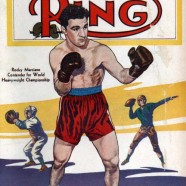
by Jim Connolly, English faculty
Jim Connolly of the English department, who has taught creative writing at Milton since 1983, has long been a poet and writer of fiction. The textbook devoted to teaching poetry that Jim developed is unique in including students’ writing and commentary. He has shared this text with many educators — individual practitioners eager to maximize their effectiveness in the discrete art of understanding teaching and teaching poetry. Jim’s poem, “Comeback,” is included in his recently published collection, Picking Up the Bodies. Jim is now at work on a novel.
Rocco Francis Marchegiano:
I met him once. He shook my hand,
said “Nice to meet you, kid” and looked
away, money on his mind.
I was with his nephew. I said
“Nice to meet you, champ” and looked
away. I was sixteen,
my own hits and licks on my mind.
Our city’s legend retired
into a dull weight of fame —
overrated, underrated —
and death in 1969,
Newton, Iowa, a mangled plane.
His body flown home to Brockton,
to our family’s funeral home,
my grandfather buried him —
my father, the embalmer, touched him up.
In 1970, I went to Des Moines, Iowa
to teach and met Lowell Coburn,
the young undertaker who shipped Rocky’s corpse
back home to Brockton.
He lived next door. “Nice to meet you,”
he said. “Coincidence is what death can give us.”
And when I returned to Brockton,
a beaten-up place with window grates
on Main Street’s abandoned stores,
the steel defending against the nothing that is left,
I couldn’t find the signs of my
old hometown. At George’s Café,
one of the city’s last landmarks,
I walked through its rooms to study
all the newspaper clippings and photos hanging
on the restaurant’s walls.
I stalked each fight in search
of the city that was gone:
Below Rocky’s photos, Ali snaps a left
through the bloody mouth of Cooper,
and Hagler’s right cross clubs
the “Motor City Cobra’s” chin,
a right, that night, as right as right,
the “Hit Man’s” legs collapsing,
his eyes on queer street,
that bewildered look that takes me
back to the rings and heavy bags
of my youth, all the bad words,
the punches given and taken.
They come back to me like letters
through a chute, the forgotten words
of a boy who learned the lessons
that each fist delivered: fight
to the death, be willing to die
on each street corner,
every win and defeat another notch
in a reputation that tells you
who you are —
I was a dumb kid,
I say to myself, who has grown old and dumb,
neither embarrassed by it nor proud of it —
we were boys who grew up in our fists.
And, today, I wonder what Rocky would say
about The Brockton Enterprise’s front page news,
the heroin addiction infecting our city,
the headlines spreading across the country,
the White House announcing
the match between the government
and the bad batch of stuff
that’s killing our city’s immigrants
in staggering numbers, the newspapers recording
each day’s deaths like judges scoring the rounds
of a one-sided fight.
And I remember my grandfather
chalking the names of the deceased on his blackboard,
the posting of the wakes and funerals.
I stare Rocky down once more.
Hanging high above the other boxers,
his right arm is raised in victory,
and that right hand, famous,
now, and then, is always
coming back to me, heroic
in that night of near defeat against Walcott,
our champ coming back in the thirteenth round,
that right smashing into Jersey Joe’s jaw,
a bullet in a bolt that locks shut —
what we had and can never get back.



